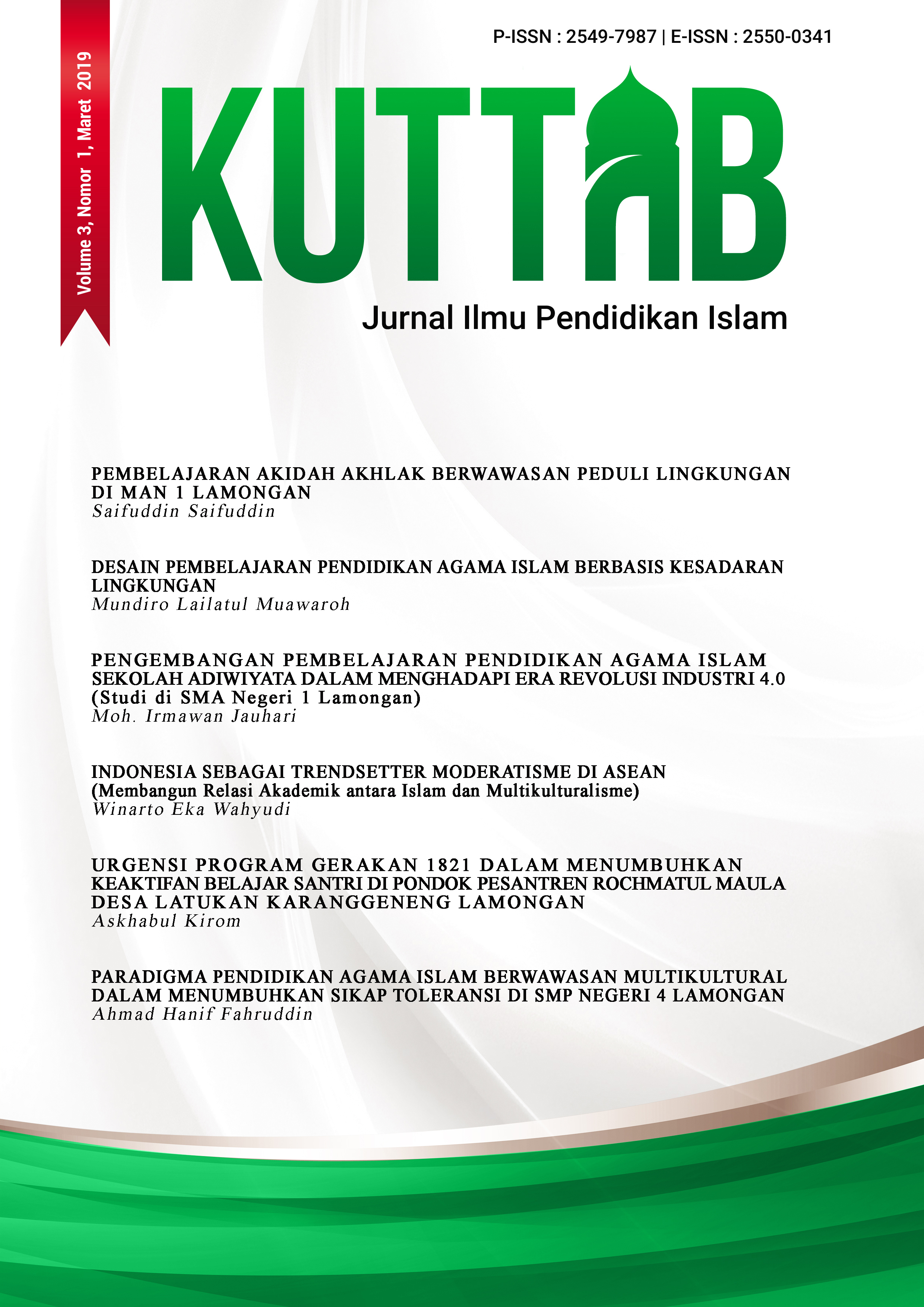INDONESIA SEBAGAI TRENDSETTER MODERATISME DI ASEAN (Membangun Relasi Akademik antara Islam dan Multikulturalisme)
DOI:
https://doi.org/10.30736/ktb.v3i1.98Abstract
Indonesia is the largest Muslim majority country in the world. So it makes perfect sense if Islam in Indonesia becomes the centre of civilization on the international scene. However, this achievement is not easy because it demands moral responsibility that Islam indeed shows its moderate and tolerant face. Why is this important? Because the entire Islamic region in the Middle East country, only shows Islam in front of conflict and war. So, the claim that the future of Islamic civilization in the world is in the hands of Indonesia is not a mere figment. For this reason, Indonesian Islam must be able to maintain and simultaneously make efforts to support the preservation of Islam that is friendly to all elements of the nation. For this reason, in this paper, the author describes how strategies so that Islam can become a value base to give birth to attitudes of moderates in the frame of Multicultural Islamic education.Downloads
References
Masdar Hilmy. Islam, Politik dan Demokrasi, Surabaya: Imtiyaz, 2014.
Nunu Ahmad an-Nahidil, “Pesantren dan Dinamika Pesan Damai†dalam Edukasi, Jurnal Penelitian Agama dan Keagamaan, Vol.4 No.3. Jakarta: Puslitbang Pendidikan Agama dan Keagamaan, Badan Litbang dan Diklat Departemen Agama RI, 2006.
Robert John Ackermann, Religion as Critique, New York: The University of Massachusetts Press Post Office Box, 1985.
Walter H. Capps, Religious Studies: The Making of a Disipline, Minneapolis: Fortress Press, 1995.
M. Nasir Tamara, (Ed.) Agama Dan Dialog Antar peradaban, Jakarta: Penerbit Paramadina, 1996
Abdullah Ali, Pendidikan Islam Multikultural di Pesantren, Telaah terhadap Kurikulum Pondok Pesantren Modern Islam as-Salam Surakarta. Yogyakarta, Pustaka Pelajar, 2011.
James A. Bank, Multicultural Education: Historical Development, Dimension and Practice, American Educational Research Association
Ahmad Zahro, Lajnah Bahtsul Masa’il 1926-1999: Tradisi Intelektual NU, Yogyakarta, LKiS, 2004.
George R. Knight, Issues and Alternatives in Educational Philosophy (Michigan: Andrews University Press, 1992.
Undang-Undang Sistem Pendidikan Nasional No 20 Tahun 2003 BAB III tentang Prinsip Penyelenggaraan Pendidikan Pasal 4 ayat 1.
T.V Savage & Armstrong, D.G, Effective Teaching in Elementary Social Studies. Ohio: Prentice Hall, 1996.
P.J Farris & S.M Cooper, Elementary Social Studies: a Whole language Approach. Iowa: Brown & Benchmark Publishers, 1994.
James .A. Banks,. “Multikultural Educatian: Historical Development, Dimentions and Practrice†In Review of Research in Education, vol. 19, edited by L. Darling- Hammond. (Washington, D.C.: American Educational Research Association, 1993.
D.J Skeel,. Elementary Social Studies: Challenge for Tomarrowâ€s World. New York: Harcourt Brace College Publishers, 1995.
Alo Liliweri, Prasangka & Konflik: Komunikasi Lintas Budaya Masyarakat Multikultural. Yogyakarta: LKiS, 2005.
C. Bennett, & E Spalding, “Teaching the Social Studies: Multiple Approaches for Multiple Perspectives†In Theory and Reseach in Social Education, 1992.
Peraturan Menteri Pendidikan Nasional No 22 Tahun 2006 tentang Standart Isi untuk Satuan Pendidikan Dasar dan Menengah pada BAB II pada bahasan Kerangka Dasar dan Struktur Kurikulum.
Syamsul Mu’arif, Pendidikan Pluralisme di Indonesia, Jogjakarta: Rake Sarasin, 2000.
Suniti, “Kurikulum Berbasis Multikulturalâ€, Edueksos, Vol III No 2, Juli 2014, 38.
James A. Bank, Multikultural Educatian: Historical Development, Dimentions and Practrice†In Review of Research in Education, vol. 19, 4.















